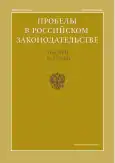On the Issue of the Main Features of the Phenomena of «Forced Migration» and «Forced Migrant»
- Authors: Petrovskaya M.I.1
-
Affiliations:
- North-West Institute of management (branch) of the Russian Presidential Academy of National Economy and Public Administration
- Issue: Vol 17, No 7 (2024)
- Pages: 40-44
- Section: Public Law (State Law) Sciences
- URL: https://journal-vniispk.ru/2072-3164/article/view/284095
- EDN: https://elibrary.ru/QBRQLO
- ID: 284095
Cite item
Abstract
The article examines the problem of differentiating the phenomena of "forced migration" and "forced migrant" from other related concepts that exist in Russian political and legal practice, including the concepts of a forced migrant and a compatriot abroad.
The need to study this problem is due to the growing relevance of forced migration issues in connection with the tense geopolitical situation throughout the world, the growing number of refugees and other categories of forced migration and the need to ensure high-quality legal regulation of forced migration issues.
The purpose of this article is to study the phenomena of forced migration and a forced migrant, to identify key features that allow separating these concepts from other related legal concepts.
In the article, within the framework of the conclusions, the key features of forced migration are identified and considered, qualitatively distinguishing this phenomenon from other related concepts and phenomena and allowing it to be singled out as an independent political and legal category. The most significant signs of forced migration include such signs as forced movement, caused by the main goal - to prevent harm to life and health, as well as imprisonment for their beliefs, as well as the absence of socio-cultural ties with Russian society and the state, which predetermines the objective need of forced migrants for measures for social adaptation and integration in the territory of the state of arrival.
Taken together, these signs allow us to distinguish the concept of forced migration and a forced migrant from other related legal phenomena.
Full Text
##article.viewOnOriginalSite##About the authors
Miroslava I. Petrovskaya
North-West Institute of management (branch) of the Russian Presidential Academy of National Economy and Public Administration
Author for correspondence.
Email: maria-petrovskaya@mail.ru
SPIN-code: 9730-6068
Cand.Sci.(Law), Senior lecturer of the constitutional and administrative law chair
Russian Federation, Saint PetersburgReferences
- Andreytso S. Yu. On the issue of some aspects of protecting the rights of foreign citizens in Russia: problems of forced and illegal migration /S. Yu. Andreytso// Law. Right. State. 2024. No. 2 (42). P. 58-60.
- Egorova E. N. Legal regulation of forced migration in the post-Soviet space: problems and development prospects / Egorova E. N., Gukepshev A. A.// Migration law. 2023. No. 2. P. 17-20.
- Karpovich O. G. Measures to improve the effectiveness of methods for protecting the rights of Russian compatriots abroad /O. G. Karpovich, L. A. Smagina // International public and private law. 2023. No. 2. P. 6-10.
- Kameneva A. N. Combating migration crime: some issues / A.N. Kameneva // Migration law. 2024. No. 2. P. 16-18.
- Mazurin S. F. Actual problems of migration in Russia / S. F. Mazurin // Migration law. 2024. No. 3. P. 15-19.
- Petrovskaya M. I. Administrative and legal regulation of public administration in the field of forced migration in the Russian Federation: dissertation ... candidate of legal sciences. Lomonosov Moscow State University. /M.I. Petrovskaya// - Moscow, 2024. 233 p.
- Petrovskaya M.I. Conceptual foundations of administrative and legal regulation of forced migration in Russia /M.I. Petrovskaya// Administrative law and process. № 10. 2024.
- Rogulsky D. A. Cultural and ideological problems in the field of adaptation and integration of migrants / D. A. Rogulsky // Migration law. 2024. № 1. P. 32-36.
- Perrushu R. International migration law: glossary of terms. / R. Perrushu // - Geneva: International Organization for Migration (IOM). 2005.
- Khabibulin A. G. Prevention of migration crime: law-forming aspect / A. G. Khabibulin, K. R. Mursalimov // Migration law. 2024. № 1. P. 12-14.
- Explanatory dictionary of the Russian language / S. I. Ozhegov, N. Yu. Shvedova; Russian Academy of Sciences, Institute of Russian. lang., Russian Cultural Foundation. - 2nd ed., corrected and enlarged. - Moscow: Az, 1994. – 907.
- Glossary on migration. Geneva: International Organization for Migration. 2019. R. 75.
Supplementary files








